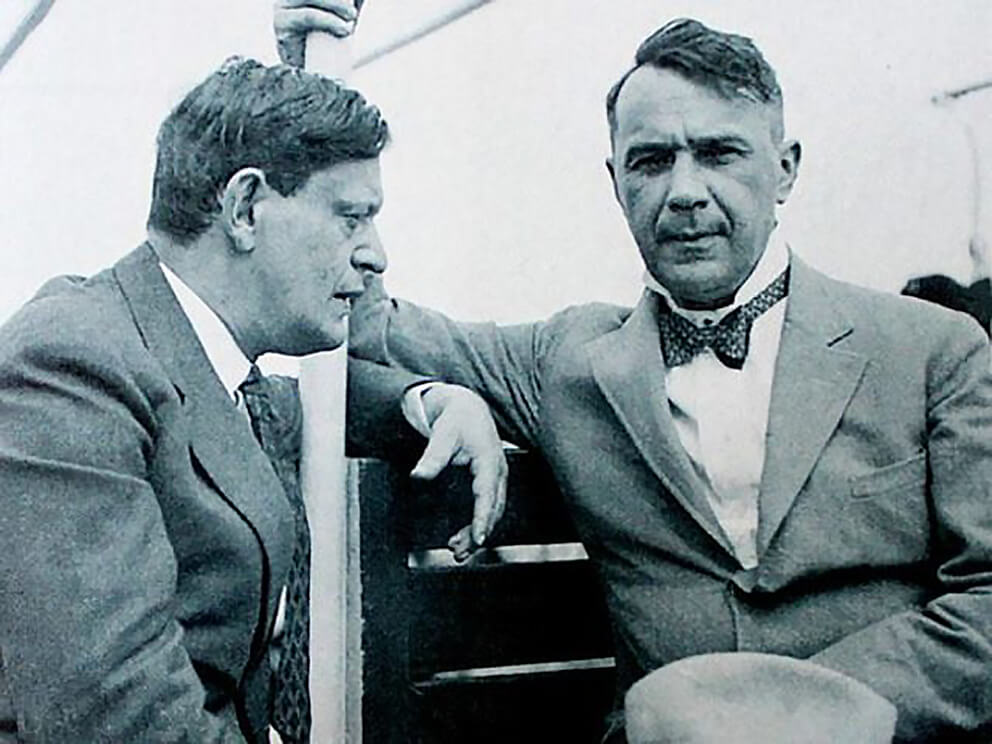Who were they?
Dezső Kosztolányi was born in 1885, in the small town of Szabadka that at the time was rich in art and eye-catching architecture. His childhood was filled with illness and fear of his strict father, but also love for his grandfather, who taught him to read and write. In his own favorite work, Laments of a poor child, he elaborates these topics: he writes from the perspective of him as a child, talking about illness, death, his family, and even his first crushes on girls.
The big overarching themes of his life’s work also can be attributed to the environment he grew up in: his incredible sensitivity to beauty and love for words and languages, but also his terrible hypochondria.
Frigyes Karinthy was born in 1887 in Budapest, in a family of 8 that sadly became 7 as they lost a mother and wife early on. He went to high school in the capital, and important aspects of his childhood also can be seen in his work, although they’re quite different from his beloved friend’s. In his arguably most popular book, Please Sir!, he draws from his experiences in high school, spinning a nostalgic and ridiculous tale. While Karinthy was mostly known for his once-in-a-generation sense of humor, he was also interested in philosophy and medicine, themes which he included in his novels.
Their friendship
Karinthy and Kosztolányi both went to university, but neither of them finished it as they fell in love with the world of literature and journalism. They were part of the legendary first generation of the Hungarian literary newspaper Nyugat, which published the most important works of 20th century Hungary. Writers of Nyugat often shared a table at New York Cafè, where they could ask for paper and ink to work on their novels and poems. The place of their first meeting, this was where the entire city would get to know the two friends as the biggest troublemakers of the literary scene.
Kosztolányi and Karinthy shared a lot of personal qualities: an aversion to authority, sentimentalism, bohemian spirit and love for a good laugh. They made fun of everything: society’s expectations, people who took themselves too seriously, rich and poor, old and young, life and death.
Their practical jokes were revealed in the works of Ilona Harmos, Kosztolányi’s wife. In these works, she remembers the many prank calls they played both on others and each other, mostly on April 1st, when they would call up random authors and poets and praise their latest work, acting like their fans. Or the time her husband returned from his trip visiting William II, the German emperor in exile, and Karinthy called them up in the middle of the night pretending to be emperor’s clerks, accusing Kosztolányi of theft. They went as far as roasting each other publicly in newspapers, or having staged fights in front of entire cafès just to embarrass others.

Endings: sad, but beautiful
Life-long friendships bear the unfortunate quality of one having to go to the other’s funeral alone. This time, it was Karinthy who had to bury his friend. They were both interested in death, often joked about it, an anecdote even states they made a bet once on which one of them was to die first. Having both faced deadly illnesses, they stood unshaken in the face of death and rather drew inspiration from it. Karinthy wrote a beautiful and heartbreaking farewell for Kosztolányi, expressing the strange feelings he felt standing at his best friend’s funeral. In the end, Karinthy said, it wouldn’t matter if it was the other way around: only one of the legendary friends would be left to say goodbye to the other.
Where can you find them?
Dezső Kosztolányi’s translated works: Dawnstruck, Kornél Esti, Anna Édes, Skylark, Laments of a poor child
Frigyes Karinthy’s translated works: Please Sir!, A Journey Round My Skull, The Circus, Voyage to Faremido




